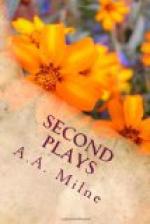(1) The pleasure of writing; or, more accurately, the hell of not writing. He gets this anyhow.
(2) The appreciation of his peers; his hope of immortality; the criticism of the experts; fame, publicity, notoriety, swank, reclame—call it what you will. But it is obvious that he cannot have it unless the masterpiece is given to the world, either by manager or publisher.
(3) Money. If the masterpiece is published only, very little; if produced, possibly a great deal.
As I say, he gets his first reward anyhow. But let us be honest with ourselves. How many of us would write our masterpieces on a desert island, with no possibility of being rescued? Well, perhaps all of us; for we should feel that, even if not rescued ourselves, our manuscripts—written on bark with a burnt stick—clutched in a skeleton hand—might be recovered later by some literary sea-captain. (As it might be, Conrad.) But how many of us would write masterpieces if we had to burn them immediately afterwards, or if we were alone upon the world, the last survivors of a new flood? Could we bear to write? Could we bear not to write? It is not fair to ask us. But we can admit this much without reserve; it is the second reward which tears at us, and, lacking it, we should lose courage.
So when the promising young dramatist has his play refused by the Managers—after what weeks, months, years of hope and fear, uncertainty and bitter disappointment—he has this great consolation: “Anyway, I can always publish it.” Perhaps, after a dozen refusals, a Manager offers to put on his play, on condition that he alters the obviously right (and unhappy) ending into the obviously foolish, but happy, ending which will charm the public. Does he, the artist, succumb? How easy to tell himself that he must get his play before the public somehow, and that, even if it is not his play now, yet the first two acts are as he wrote them, and that, if only to feel the thrill of the audience at that great scene between the Burglar and the Bishop (his creations!) he must deaden his conscience to the absurdity of a happy ending. But does he succumb? No. Heroically he tells himself: “Anyway, I can publish it; and I’m certain that the critics will agree with me that——” But the critics are too busy to bother about him. They are busy informing the world that the British Drama is going to the dogs, and that no promising young dramatist ever gets a fair chance.
Let me say here that I am airing no personal grievance. I doubt if any dramatist has less right to feel aggrieved against the critics, the managers, the public, the world, than I; and whatever right I have I renounce, in return for the good things which I have received from them. But I do not renounce the grievance of our craft. I say that, in the case of all dramatists, it is the business of the dramatic critics to review their unacted plays when published. Some of them do; most of them do not. It is ridiculous for those who do not to pretend that they take any real interest in the British Drama. But I say “review,” not “praise.” Let them damn, by all means, if the plays are unworthy; and, by damning, do so much of justice to the Managers who refused them.




